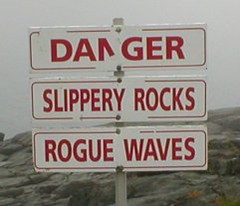Supreme Court of Canada Strikes Down Security Certificates
A lot of people I know have been working for a long time on this.
It hasn't been part of my day-to-day work, being mostly pursued by the national organizations, but it's been something I've been keeping an eye on.
Even so, I was surprised at the intensity of my reaction when I read the news this morning. I felt very emotional. It really felt like a terrible injustice was beginning to be corrected.
This is the best possible income, I think. The Supreme Court is acknowledging that some special mechanisms for investigating terrorism suspects must be in place, and acknowledges that some information must be treated with high sensitivity. At the same time, it has confirmed what human rights groups said all along - that detaining someone indefinitely, while not allowing them or their lawyers to know anything about the nature of the evidence against them - is completely contrary to Canada's understanding of inalienable human rights. From the above-linked Globe and Mail story:
"While carefully paying heed to fears of terrorism and the special
difficulties of protecting national security, the court said that certain
elements of fairness cannot be dispensed with -- including the right of a
detainee to know the case against them and to make full answer and
defence.
'While there is a risk of catastrophic acts of violence, it would be
foolhardy to require a lengthy review process before a certificate
should be issued,' the court said.
However it said the various forms of review in which a designated lawyer is empowered to act on behalf of detainees could pass constitutional muster."
The groups that have been working on this issues - Amnesty International Canada and others - have always suggested some kind of middle ground that protected security while not involving a draconian suppression of human rights. For example, as suggested above, an independent lawyers could be allowed to see the evidence against the detainee; while the detainee and his or her lawyer would not have access to it, a third party could at least determine if it seemed to be reasonable grounds for detention.
There are many routes for compromise, and the Supreme Court has given the Canadian government a year to find some. It is a just response to an untenable situation. Locking people up, indefinitely, without charges, without informing them of the charges against them, and without allowing them or their lawyers to see any of the evidence against them, seems the very definition of "un-Canadian".
ronnie
Labels: human rights



1 Comments:
hi,
i am delfina,from turkey.my blog's name like yours.nice to meet you.
Post a Comment
Subscribe to Post Comments [Atom]
<< Home